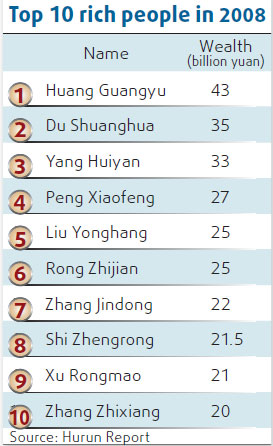Faced with a sharp decline in their net worth, extravagant Chinese millionaires are tightening their belts, too. Even the Cartier remains a Cartier.
"In the two months from early September to early November, the average wealth of the richest who own listed companies shrank by 45 percent, after an over-20 percent fall earlier in 2008," said Rupert Hoogewerf, chairman of luxury publishing group Hurun Report, which releases the Hurun Rich List of Chinese tycoons and entrepreneurs annually.

"Since then, the number probably came down further," Hoogewerf said, adding that people have a lot less cash to play with after tens of millions of yuan worth of their assets evaporated in the stock market.
On Hurun's rich list published October, the average wealth of the top 20 richest owning publicly listed companies fell by over a half, or 131.5 billion yuan, from 2007 as the financial crisis ate into stock prices.
And gone with those huge amounts of wealth is at least some measure of the ultra-rich's consumption confidence.
"Surprisingly, the rich we surveyed said that their average spending this year was two million yuan, which is significantly less than I expected," Hoogewerf said.
International media usually report that the rich in China spend four to five million yuan a year, he added.
Well-to-do Chinese are shifting their investment priorities from the stock market, which contributed the most of their ballooning wealth in 2007, to the property sector, according to the latest survey on China's elite consumer preferences contained in the Hurun Report released yesterday.
The survey polled 345 respondents with assets of at least 10 million yuan. The number of people opting to pour capital into stocks dropped to 18 percent for 2009 from 33 percent the previous year, while 34 percent of the wealthy chose the property market for investment, up 8 percent from 2007.
And many of the ultra-rich are turning risk-averse. Among the respondents, of which 43 percent are from manufacturing and realty sectors, half said they prefer rational investment.
Sure, the country's affluent aren't exactly scrimping. The largest proportion of their spending goes to daily luxury goods, followed by gifts and children's education. And the rich from the manufacturing powerhouse Zhejiang Province had the most buying power in luxury items.
"Although the sales of luxury goods in China is expected to see slowing this year, China remains the most important market for luxury brands," said Hoogewerf.
(China Daily January 16, 2009)